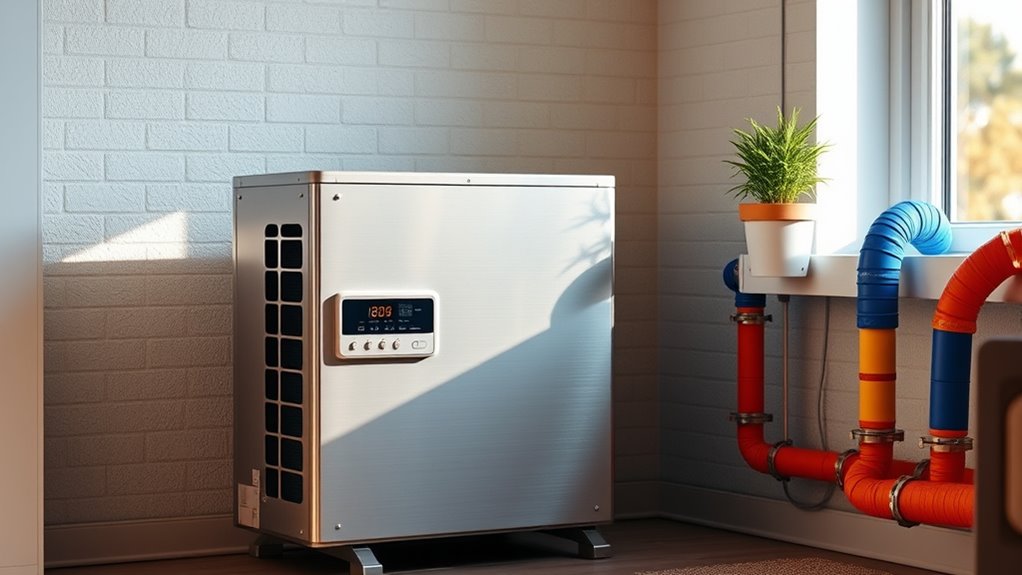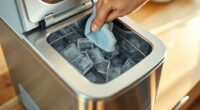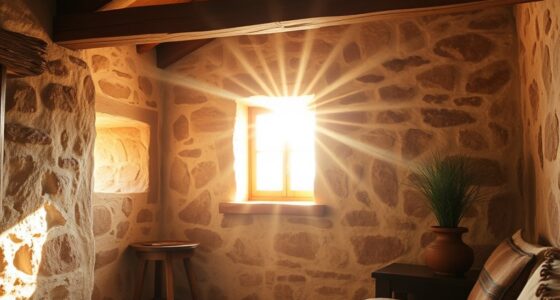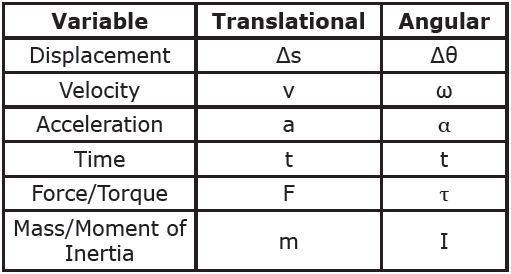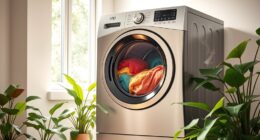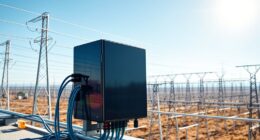Heat pumps in small homes provide an efficient way to heat and cool with a single system, saving space and cutting energy costs. They transfer heat more efficiently than traditional systems, leading to lower utility bills over time. While initial costs may be higher, the long-term savings and quick return on investment make them a smart choice. To get the most out of a heat pump, understanding installation, system type, and climate relevance is key—all the details await you.
Key Takeaways
- Heat pumps combine heating and cooling in one efficient, space-saving system ideal for small homes.
- They transfer heat using less energy, resulting in lower utility bills over time.
- Proper installation by skilled professionals ensures optimal performance and energy savings.
- Upfront costs are higher but offset by long-term savings and potential incentives.
- Choosing the right type (ductless or central) depends on home size, existing infrastructure, and climate.
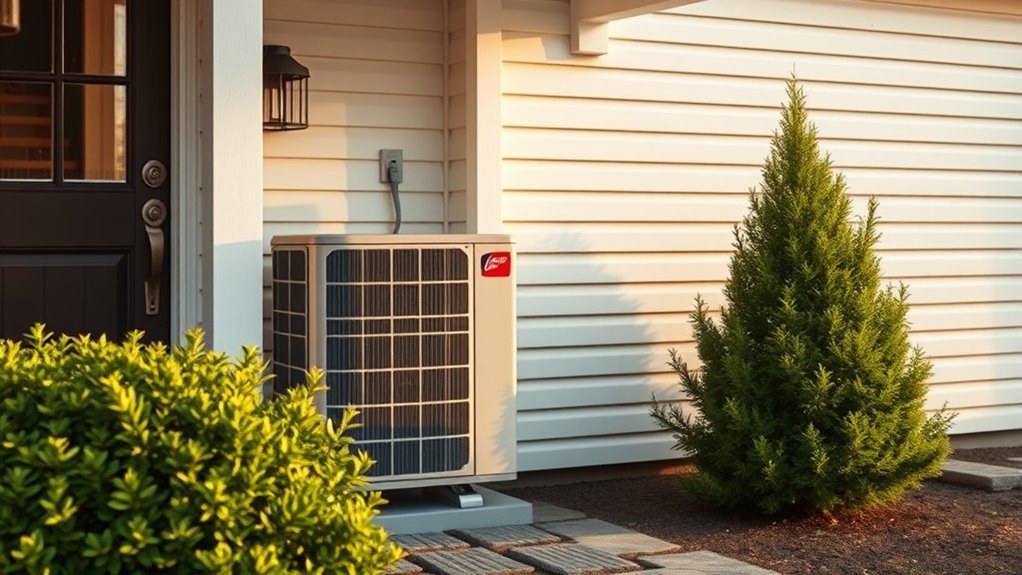
Heat pumps are a smart and efficient way to heat and cool small homes, especially as energy costs rise. They provide a versatile solution, combining heating and cooling functions into a single system, which can save you space and reduce overall energy bills. One of the main advantages of heat pumps is their excellent energy efficiency. Unlike traditional heating systems that generate heat through combustion or electrical resistance, heat pumps transfer heat from the outside air into your home during winter and reverse the process in summer to cool your space. This transfer process uses substantially less energy, helping you lower your utility bills over time. Because of this efficiency, many homeowners find that investing in a heat pump pays off quickly, especially when compared to older, less efficient systems.
However, when considering a heat pump, you should also think about installation costs. These costs can vary depending on the type of heat pump you choose, your home’s size, and existing ductwork or electrical systems. Generally, heat pumps have higher upfront costs than traditional HVAC units, mainly due to the equipment itself and the complexity of installation. For example, a ductless mini-split system might have a different price point than a central heat pump system that requires ductwork modifications. While the initial investment can seem steep, it’s important to remember that the energy savings you’ll enjoy over the years can offset this expense. Many manufacturers and installers also offer financing options or incentives that can make the upfront costs more manageable.
Furthermore, the installation process itself is vital to ensuring your heat pump operates at peak efficiency. Proper sizing, placement, and calibration are essential. An incorrectly installed system may not deliver the expected energy efficiency benefits and could lead to higher running costs or maintenance issues later on. That’s why it’s wise to work with experienced professionals who understand the nuances of small home layouts and climate considerations.
Frequently Asked Questions
How Long Do Heat Pumps Typically Last in Small Homes?
Heat pumps in small homes typically last around 10 to 15 years, depending on usage and maintenance. Proper upkeep can extend their longevity, delaying replacement costs. You should plan for a replacement around the 10 to 15-year mark to avoid unexpected breakdowns. Regular servicing helps maintain peak efficiency, ensuring your heat pump provides reliable heating and cooling for as long as possible, maximizing your investment’s value.
Are Heat Pumps Suitable for Extremely Cold Climates?
Think of a heat pump as a brave explorer venturing into a cold climate. While they can work efficiently in milder weather, extreme cold can challenge their performance and efficiency. You might notice reduced heating power and increased energy use. For cold climates, consider models designed specifically for frigid conditions or supplement with a backup heating system to keep your home warm and cozy without worries.
What Maintenance Is Required for Small Home Heat Pumps?
You need to regularly check your small home heat pump’s refrigerant levels and clean or replace filters to guarantee system efficiency. Schedule annual professional maintenance to inspect components, clear debris around the outdoor unit, and verify electrical connections. Proper upkeep keeps your heat pump running smoothly, saving energy and prolonging its lifespan. Staying attentive to these tasks helps maintain peak system efficiency and prevents costly repairs down the line.
Can Heat Pumps Also Provide Hot Water for My Home?
Think of your heat pump as a versatile artist, capable of painting warmth not just for heating but also for hot water. Many models now integrate with solar systems, boosting efficiency and reducing bills. By adding solar integration, your heat pump can efficiently supply hot water, making your home more eco-friendly. This dual-function approach helps you save energy, lower costs, and enjoy a seamless, sustainable comfort all year round.
How Do I Choose the Right Size Heat Pump for My Space?
To select the right size heat pump, consider your space’s heating and cooling needs, factoring in size, insulation, and climate. Proper sizing guarantees efficiency, so avoid units that are too small or large, which can waste energy. Sizing considerations include calculating heat load requirements, while efficiency factors like SEER and HSPF ratings help you choose a model that saves money and performs well year-round.
Conclusion
Now that you know how heat pumps work in small homes, it’s clear they’re a smart choice for comfort and efficiency. With proper installation and maintenance, you can keep your home cozy without breaking the bank. Think of your heat pump as the backbone of a well-oiled machine—reliable and ready to serve. Embrace this technology, and you’ll find it’s a win-win, helping you stay warm while saving money in the long run.
